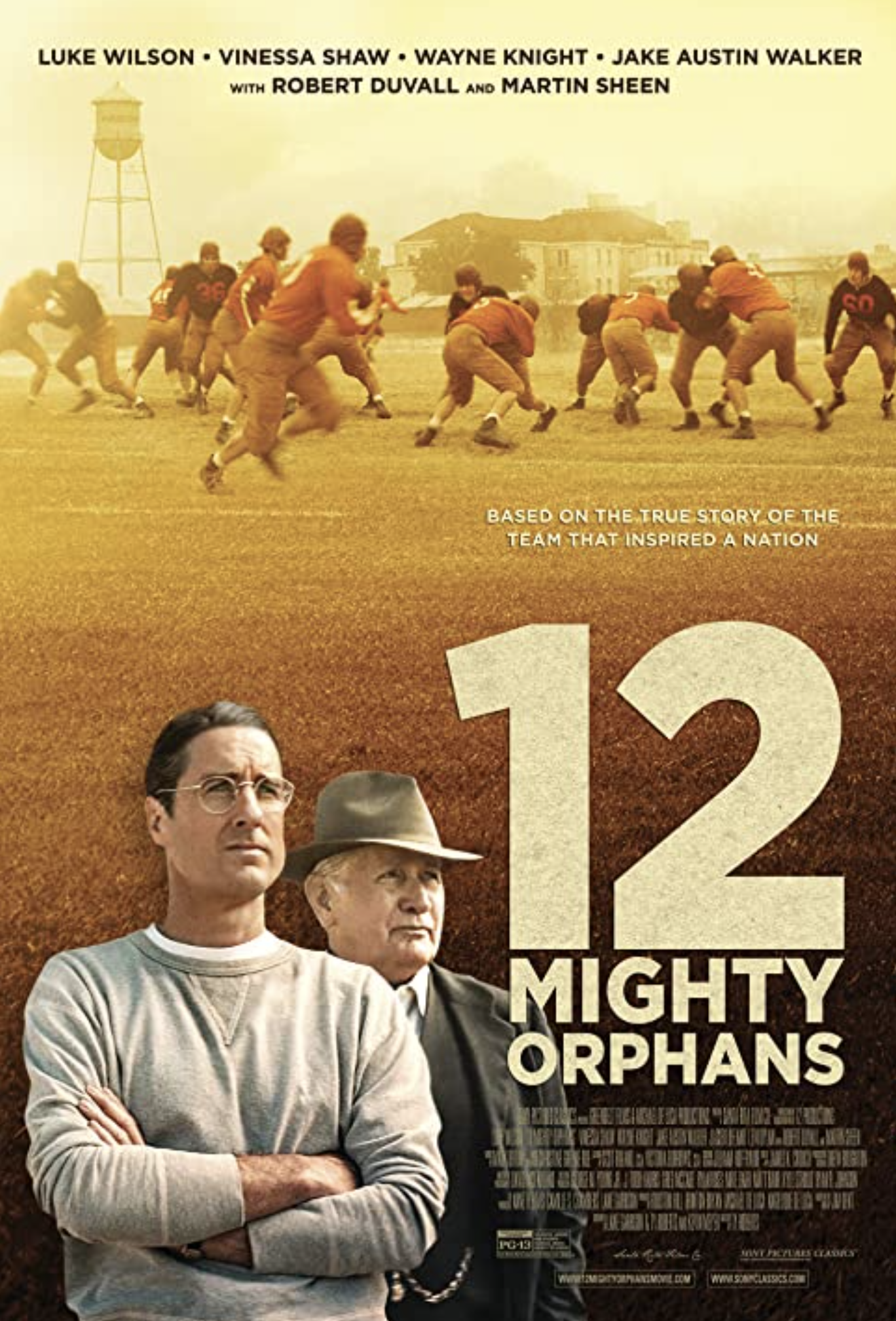Who needs another football underdog story? We do. We all do. Based on the book by Jim Dent and Lane Garrison, and the true events of the Mighty Mites, Ty Roberts, co-writer and director of the film, brings us a heartfelt story of what it means to be a family and support one another no matter the adversity.
Taking place back in 1938, Rusty Russell (Luke Wilson) arrives in a barren and impoverished area near Fort Worth, Texas with his wife and daughter begrudgingly in tow. Always looking on the bright side, they spy the massive institution of the Masonic Home for Orphans that will be their new residence. Meeting Frank Wynn (Wayne Knight), the director of the facility, and the gregarious resident doctor, Doc Hall (Martin Sheen), it’s evident there’s trouble ahead.
Russell, summoned to the orphanage by Doc, will not only teach Math and Science, but will also be the coach of a currently non-existent football team. The family’s quarters, rat-infested and dilapidated, is a far cry from their former abode in Pennsylvania, but Russell’s commitment and immediate devotion cannot be swayed even in the midst of putting together a completely inexperienced, oftentimes non-compliant, and raw team. Wynn, an abusive authoritarian with ulterior motives of running this home, is despicable with his tentacles of avarice reaching far and wide, especially as he attempts to thwart the success of Russell and the boys.
Russell has his own history and demons to deal with as he endeavors to connect with and help these forgotten “second class citizens.” He’s a veteran of WWI and suffers from PTSD as we experience flashbacks in his life, witnessing the additional atrocities that, in many ways, help him reach these rejected children. Together, with time, love, and a common goal, the boys become a family with both Doc and Russell as surrogate fathers, even as the odds are stacked against them.
Sony’s “12 Mighty Orphans” begins with what feels like a stereotypical Disney touch. Narrated by Sheen, it’s an ode to story telling of years gone by, but this also helps to accentuate the era of the story. Initially, Russell seems too good to be true; he’s kind, compassionate, and understanding to an exponential degree. Additionally, Wynn is a caricature of an evil-doer who you can almost see snickering as he commits his dastardly deed. Thankfully, these over-the-top representations and performances quickly dampen and a more realistic and heartfelt story finds its way to the forefront.
The story takes us through the football season of 1938; shoeless, lacking equipment, and getting pummeled in their first game. Always taking the high road and finding a way to work with what he’s got, Russell, credited for creating the first “spread” formation in football, thinks outside the box to help the boys capture something they’ve long forgotten: hope. Win after win, they become a formidable team, but there’s always someone looking to take them down. It’s a classic story, but it’s one in which we are completely invested as we sit on the edge of our seats for the finale.
With any “Cinderella story,” we know the arc of it. There are trials and tribulations, but in the end good triumphs over evil. And while this story may be no different, the obstacles they face certainly are. Co-writers Dent and Kevin Meyer also take the time and care to give each of the characters a story and backstory with unique personalities. Attention to these details connects us, the viewer, to the every element of the film. The end result and ending are not what you expect making it a more dramatically powerful story.
Wilson’s understated performance gives the character of Russell a deeper and more complex persona. It’s a delicate balance, but Wilson seems to be directly connected to his role. Sheen also finds the right path as he, too, could have gone too far in one direction or another to give Doc Hall a more comedic and less credible performance, but he doesn’t. We are endeared to him and root for him to overcome his tragedies as well.
This is the story of the boys, the orphans, and each of them, perfectly cast to represent the real youngsters, allows us to truly know them. Jake Austin Walker (Hardy Brown) takes the lead in this group, the most overtly troubled character in the bunch, and elicits incredible empathy as we watch him wrestle with his inner demons. Jacob Lofland (Snoggs), Slade Monroe (Wheatie), Sampley Barinaga (Chicken) and Woodrow Luttrell (Leon Pickett) are all standout characters in this group of connected misfits.
“12 Mighty Orphans” is a familiar story with its own unique elements reminding us of the definition of family in its truest form. The film has plenty of lessons, ones which can never be repeated too often, and all of which will leave you feeling satisfied and buoyed with hope. While the film has a rocky start, the road smoothes out quickly to give us an entertaining and enjoyable story. Be sure to stick around for the credits to meet the real “kids” and find out what became of them.
3 stars

